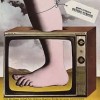[Holding the Holy Hand Grenade of Antioch]
KING ARTHUR: How does it — um — how does it work?
SIR LANCELOT: I know not, my liege.
KING ARTHUR: Consult the Book of Armaments.
BROTHER MAYNARD: Armaments, chapter two, verses nine through twenty-one.
CLERIC: [reading] And Saint Attila raised the hand grenade up on high, saying, “O Lord, bless this thy hand grenade, that with it thou mayst blow thine enemies to tiny bits, in thy mercy.” And the Lord did grin. And the people did feast upon the lambs, and sloths, and carp, and anchovies, and orangutans, and breakfast cereals, and fruit bats, and large chu–“
BROTHER MAYNARD: Skip a bit, Brother.
CLERIC: And the Lord spake, saying, “First shalt thou take out the Holy Pin. Then shalt thou count to three, no more, no less. Three shall be the number thou shalt count, and the number of the counting shall be three. Four shalt thou not count, neither count thou two, excepting that thou then proceed to three. Five is right out. Once the number three, being the third number, be reached, then lobbest thou thy Holy Hand Grenade of Antioch towards thy foe, who, being naughty in My sight, shall snuff it.”
BROTHER MAYNARD: Amen.
ALL: Amen.
KING ARTHUR: Right. [pulls pin] One … two … five!
GALAHAD: Three, sir.
KING ARTHUR: Three! [throws grenade]
Quotations about:
weapon
Note not all quotations have been tagged, so Search may find additional quotes on this topic.
Nothing I accept about myself can be used against me to diminish me.
Audre Lorde (1934-1992) American writer, feminist, civil rights activist
“Eye to Eye: Black Women, Hatred, and Anger,” Sister Outsider: Essays and Speeches (1984)
(Source)
The very presence of a weapon provokes a man to use it.
[αὐτὸς γὰρ ἐφέλκεται ἄνδρα σίδηρος.]
Homer (fl. 7th-8th C. BC) Greek author
The Odyssey [Ὀδύσσεια], Book 16, l. 294 (16.294) [Odysseus] (c. 700 BC) [tr. Rieu (1946)]
(Source)
(Greek (Source)), repeated in 19.13.
In Book 16, Odysseus offers this as part of the argument Telemachus can use to the suitors to explain why he has stripped the hall of weapons -- that, should the weapons remain, they might tempt drunken people to violence. Book 19, back at the hall, Odysseus repeats almost the same instructions to Telemachus. The same Greek is used for this phrase in both passages; some translators use the same language, others make changes to it.
Epigram (and title inspiration) in Joe Abercrombie's The Blade Itself (2006) -- "The blade itself incites to deeds of violence." Abercrombie was a fan of the Rome: Total War game, which included in its load pages the translation, "The blade itself incites to violence.
BOOK 16, l. 294
- "Steel itself, ready, draws a man to blows." [tr. Chapman (1616)]
- "One drawn sword draws another." [tr. Hobbes (1675), l. 276]
- "Oft ready swords in luckless hour incite / The hand of wrath, and arm it for the fight." [tr. Pope (1725)]
- "For the view / Itself of arms incites to their abuse." [tr. Cowper (1792), l. 348]
- "Steel itself oft lures a man to fight." [tr. Worsley (1861), st. 37]
- "Steel itself wooes men to battle!" [tr. Bigge-Wither (1869)]
- "For the steel blade itself lures men to blood." [tr. Musgrave (1869), l. 462]
- "For iron of itself draws a man thereto." [tr. Butcher/Lang (1879)]
- "For this is said aright, / That e'en of himself the iron draws on a man to smite." [tr. Morris (1887)]
- "Steel itself draws men on." [tr. Palmer (1891)]
- "For the sight of arms sometimes tempts people to use them." [tr. Butler (1898)]
- "For of itself does the iron draw a man to it." [tr. Murray (1919)]
- "Iron of itself tempts man's frailty." [tr. Lawrence (1932)]
- "Tempered iron can magnetize a man." [tr. Fitzgerald (1961)]
- "Iron all of itself works on a man and attracts him." [tr. Lattimore (1965)]
- "For iron of itself can tempt a man." [tr. Mandelbaum (1990)]
- "Iron has powers to draw a man to ruin." [tr. Fagles (1996)]
- "There's a force in iron that lures men on." [tr. D. C. H. Rieu (2002)]
- "For iron itself draws a man to employ it." [tr. Merrill (2002)]
- "Iron of itself draws a man on." [tr. Verity (2016)]
- "Weapons themselves can tempt a man to fight." [tr. Wilson (2017)]
- "For iron of itself attracts a man." [tr. Green (2018)]
- "Iron attracts a man all on its own." [tr. Johnston (2019)]
- "And beckoning, the iron itself drags the man." [Source]
BOOK 19, l. 13 -- items in italics are the same as their Book 16 counterparts.
- "As loadstones draw the steel, so steel draws man." [tr. Chapman (1616)]
- "One drawn sword draws another." [tr. Hobbes (1675)]
- "By sight of swords to fury fired." [tr. Pope (1725)]
- "For the view / Itself of arms incites to their abuse." [tr. Cowper (1792)]
- "Steel itself oft lures a man to fight." [tr. Worsley (1861), st. 2]
- "The sight of iron tempts to use it!" [tr. Bigge-Wither (1869)]
- "For the steel blade itself / Lures men to blood." [tr. Musgrave (1869)]
- "For iron of itself draws a man thereto." [tr. Butcher/Lang (1879)]
- "For e'en of himself the Iron to battle draweth men." [tr. Morris (1887)]
- "Steel itself draws men on." [tr. Palmer (1891)]
- "For the sight of arms sometimes tempts people to use them." [tr. Butler (1898)]
- "For of itself does the iron draw a man towards it." [tr. Murray (1919)]
- "Iron has that attraction for men." [tr. Lawrence (1932)]
- "The very presence of a weapon provokes a man to use it." [tr. Rieu (1946)]
- "Iron itself can draw men's hands." [tr. Fitzgerald (1961)]
- "Iron all of itself works on a man and attracts him." [tr. Lattimore (1965)]
- "For iron of itself can tempt a man." [tr. Mandelbaum (1990)]
- "Iron has powers to draw a man to ruin." [tr. Fagles (1996)]
- "Steel has a way of drawing a man to it." [tr. Lombardo (2000)]
- "There's a force in iron that lures men on." [tr. D. C. H. Rieu (2002)]
- "For iron itself draws a man to employ it." [tr. Merrill (2002)]
- "For iron of itself draws a man on." [tr. Verity (2016)]
- "For iron of itself attracts a man." [tr. Green (2018)]
- "For iron by itself / can draw a man to use it." [tr. Johnston (2019)]
The tongue is not steele, yet it cuts.
George Herbert (1593-1633) Welsh priest, orator, poet.
Jacula Prudentum, or Outlandish Proverbs, Sentences, &c. (compiler), # 838 (1640 ed.)
(Source)
Now any dogma, based primarily on faith and emotionalism, is a dangerous weapon to use on others, since it is almost impossible to guarantee that the weapon will never be turned on the user.
It demonstrated that old adage: never bring a gun to a fight where the other guy has a time-machine and tomorrow’s newspapers.
James Nicoll (b. 1961) Canadian reviewer, editor
“OTT: If ye break faith with us who die,” rec.arts.sf.written, Usenet (27 Apr 2006)
(Source)
I would not take this thing, if it lay by the highway. Not were Minas Tirith falling in ruin and I alone could save her, so, using the weapon of the Dark Lord for her good and my glory. No, I do not wish for such triumphs, Frodo son of Drogo.
Your race, in its poverty, has unquestionably one really effective weapon — laughter. Power, Money, Persuasion, Supplication, Persecution — these can lift at a colossal humbug, — push it a little — crowd it a little — weaken it a little, century by century: but only Laughter can blow it to rags and atoms at a blast. Against the assault of Laughter nothing can stand. You are always fussing and fighting with your other weapons. Do you ever use that one? No; you leave it lying rusting. As a race, do you ever use it at all? No; you lack sense and the courage.
Mark Twain (1835-1910) American writer [pseud. of Samuel Clemens]
“The Chronicle of Young Satan” (c.1897–1900, unfinished)
(Source)
Often paraphrased: "The human race has one really effective weapon, and that is laughter." This is an excised passage from what was eventually posthumously published as No. 44, The Mysterious Stranger (1916).
Nonviolence is a powerful and just weapon. Indeed, it is a weapon unique in history, which cuts without wounding and ennobles the man who wields it.
The truth is often a terrible weapon of aggression. It is possible to lie, and even to murder with the truth.










